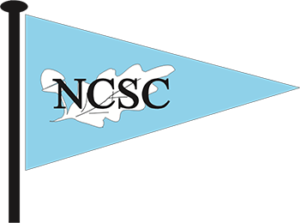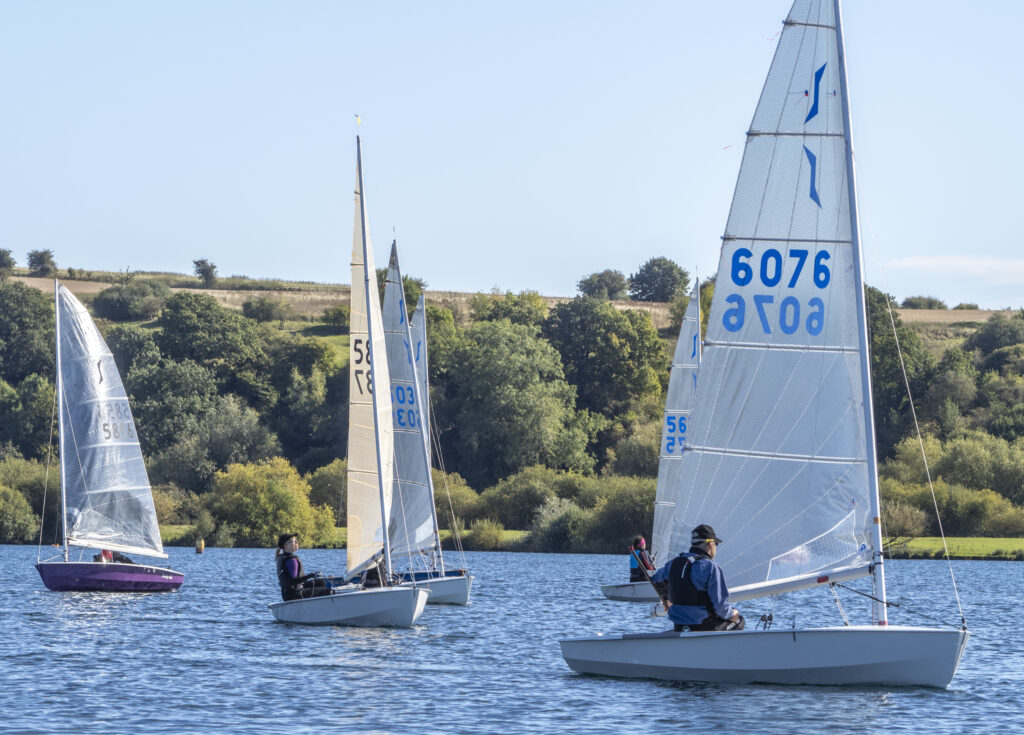Classes
Notts County provides fleet racing for its adopted classes on Sundays as well as starts for the Handicap fleet, Windsurfers and Juniors. On other days the dinghy starts are all handicap races.
To find out more about types of boat and the racing we offer visit the club (best day is a Sunday) and ask for the fleet representative or a member of the Executive or Sailing committee.
Below are some details of each fleet.
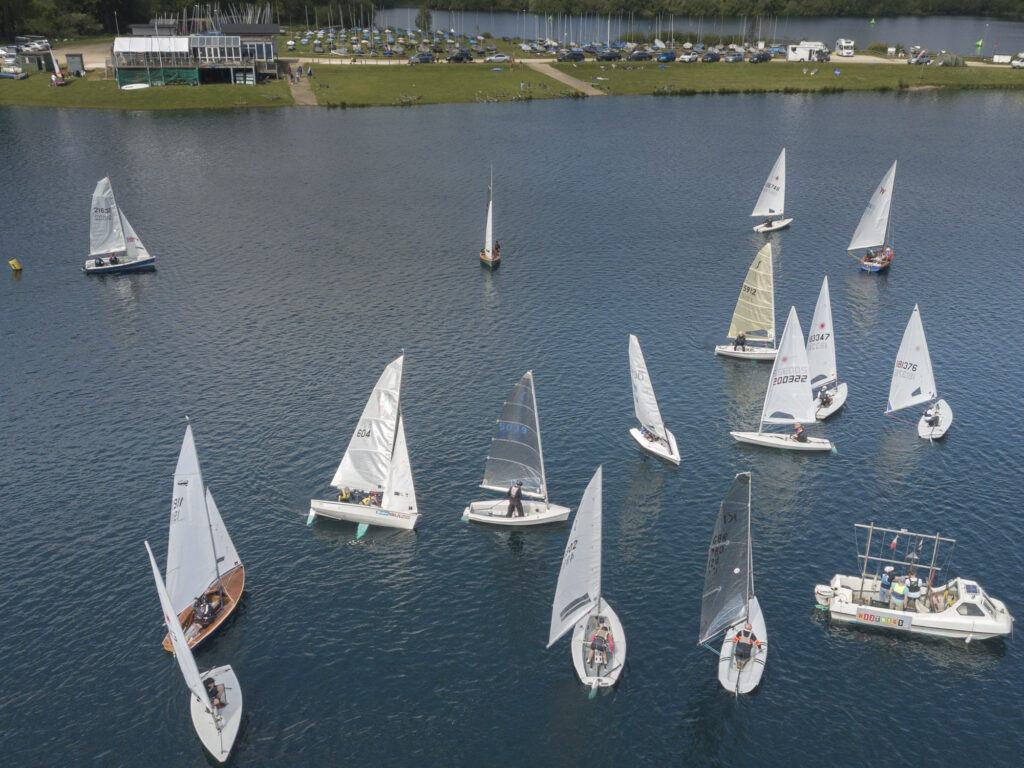
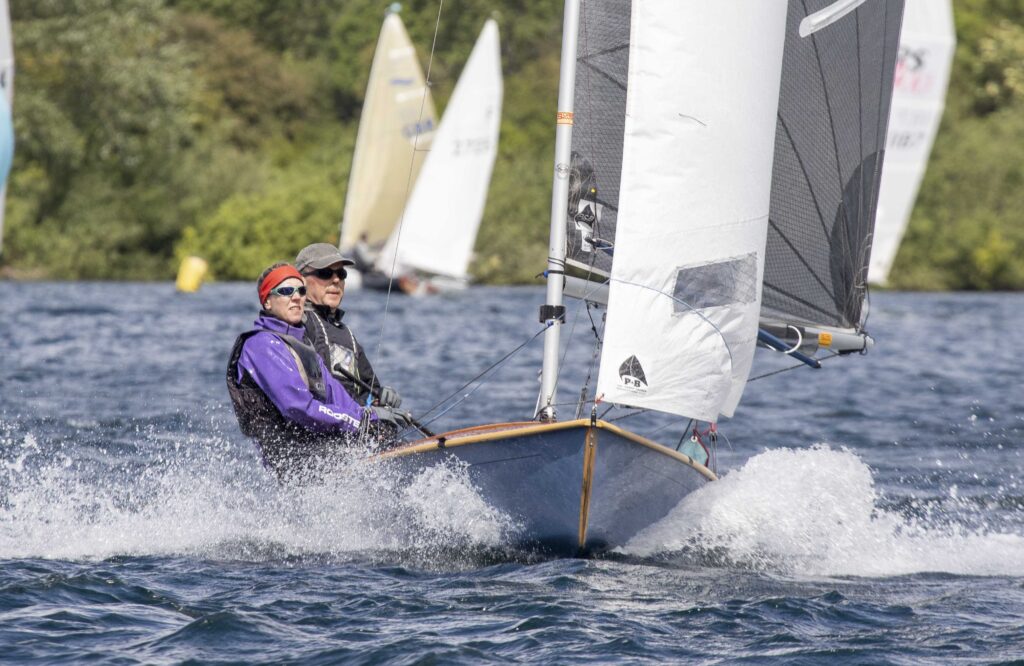
Notts County currently boasts one of the largest fleet of Scorpions in the UK, and has a three times Scorpion National Champion in its ranks.
Always interesting and, more often than not, exciting to sail the National Scorpion is a classic lightweight 14′ two person, three sail racing dinghy.
With it’s raking rig, the boat is good across a range of different crew weights, ages and ability, and is at home as much on the sea as on inland waters.
The class has an active association and www.Sailscorpion.co.uk is a useful starting point for help and advice. As well as having a classified section for second-hand gear & boats, there is a calendar of open & Nationals events and an on-line forum for all things Scorpion.
The Notts fleet are always happy to provide help and advice, and of course tuning guides and advice are also available from Pinnell & Bax, North and HD Sails’ web-sites.
Please keep your fleet captains up to date with your email address, as we provide regular updates on and off the water via the NCSC Scorpion Fleet Newsletter
The Scorpion Fleet takes prides in being the friendly fleet, and a warm welcome awaits you at Notts County.
Scorpion fleet Facebook page please like to get regular updates etc from the fleet captain.
Contact – John Tailby – Fleet Captain
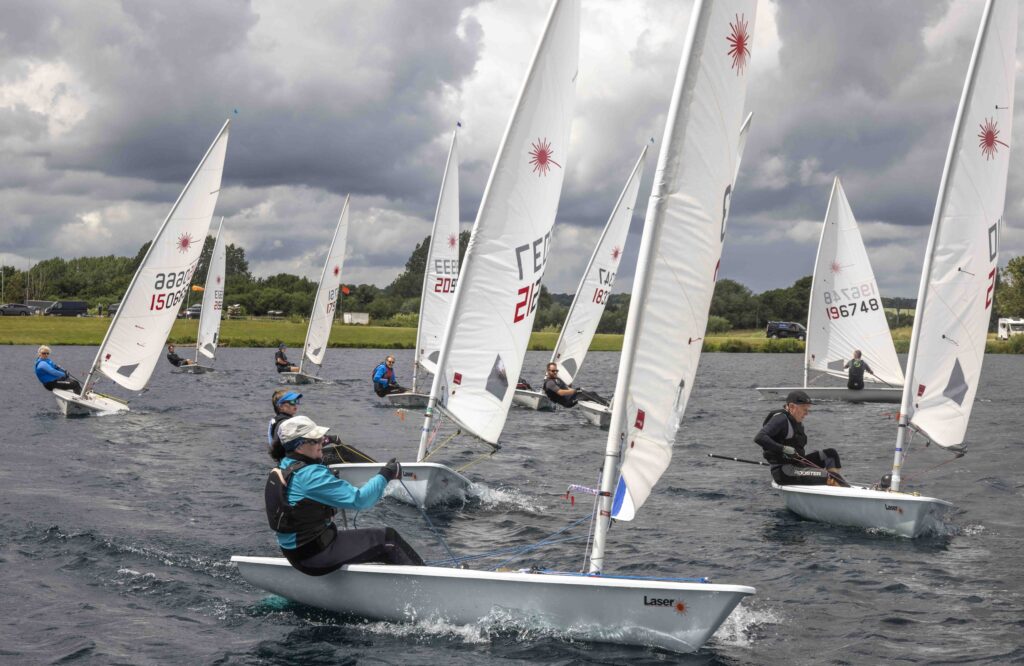
One of the greatest things about our boat is that it offers a huge amount of fun and family pleasure to all ages yet at the same time it satisfies the desire for excellence and a physical test at the highest level in the Olympic Games. The ILCA (Laser) is something very special. Over 200,000 owners have been attracted to its simple charm and continue to be attracted at a rate of nearly 4000 new boats per year.
Seeing 15 and 16 year old youngsters, fresh out of Optimists, getting a thrill out of sailing an Olympic class boat in full control with the ILCA (Laser) 4.7 or ILCA (Laser) Radial rig is as exciting as listening to the stories of 60 year old Masters recounting their wild rides on Pacific rollers during the 1997 World Masters Championship in Chile.
The ILCA (Laser) is challenging and it is rewarding whether it be at club level or the Olympic Games. When you take your 10 year old boat out for a local race the challenge is to work harder, hike longer, be smarter and sail better than the other ILCA (Laser) sailors. At the end of the race you count the number of boats behind you and you are rewarded with the knowledge that you beat them fair and square by your own skill and effort. Even if there are no boats behind you the challenge is to go out next time knowing that you have the same equipment and the potential to improve.
And there is a bonus! It is quick to rig, it keeps you fit and is inexpensive.
When you look in the centre pages of the Handbook and count ILCA (Laser)s sailing in 115 different countries all over the world and you see that the ILCA (Laser) class has achieved the highest ever country entry at the Olympic Games, and see how many countries are entering ILCA (Laser) World Championships, you perhaps realise just how great our little boat is and why it is so important to look after it with a strong class association.
The ILCA (Laser) Formula
The ILCA (Laser) Formula: A choice of rigs for different weight sailors = Three boats in One
- Are your children reaching the age when they want to go sailing in a ILCA (Laser) by themselves?
- Does your husband or wife fancy the occasional sail in your ILCA (Laser)?
- When you drive 2 hours to get to the water have you found it is too windy for you to go sailing?
- Maybe you are too light to sail the ILCA (Laser) with the Standard rig?
The ILCA (Laser) Formula is the answer to all these questions. By changing only the sail and lower mast the ILCA (Laser) can be sailed comfortably in all wind conditions and provide exciting but controlled sailing for any sailor weighing as little as 35 kg. The ILCA (Laser) Formula is a 3 rig option that has been adopted by a number of sailing schools as a simple and economical way to keep sailing in all winds and reduce the amount of ‘down time’.
The ILCA (Laser) 4.7 uses a short pre-bent lower mast to maintain a balanced helm and a sail area that is 35% smaller than the ILCA (Laser) Standard. It is ideal for learning to sail or for the lighter weight sailor graduating from Optimist.
The ILCA (Laser) Formula
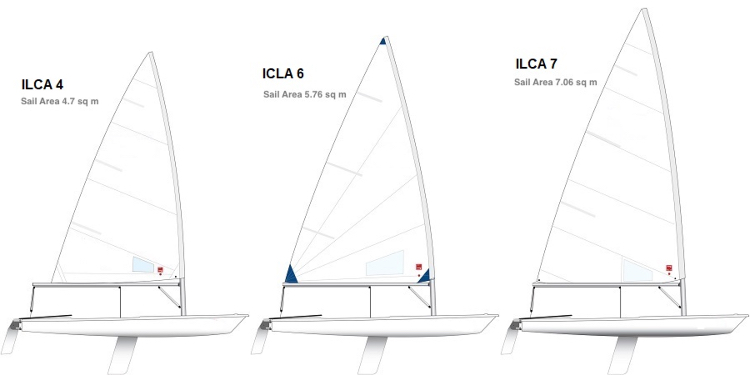
The ILCA (Laser) Radial is the next step up. It uses a more flexible and slightly shorter lower mast together with a sail area 18% smaller than the ILCA (Laser) Standard. The ILCA (Laser) Radial has a large following with national and international regattas and World Open &Youth Championships attracting as many countries and competitors as the ILCA (Laser) Standard Rig. As well as a strong following amongst lighter weight sailors the ILCA (Laser) Radial is also used for youth, women and masters racing. Many countries now support a full ILCA (Laser) Radial Youth programme and in a survey of national yachting authorities conducted by the International Sailing Federation the majority replied that the ILCA (Laser) Radial was their preferred youth boat.
The ILCA (Laser) Standard can be sailed by any weight in light winds, but as the wind increases it is better suited to higher sailor weights.
Apart from the strong second hand market in ILCA (Laser)s with the ILCA (Laser) Standard rig, there is an even stronger second hand market for ILCA (Laser) Radial and ILCA (Laser) 4.7 lower mast and sails as a separate package from the hull.
Class website:- https://www.ILCA (Laser)international.org/
NCSC Class representative: Sarah Mason laser@ncsc.org.uk
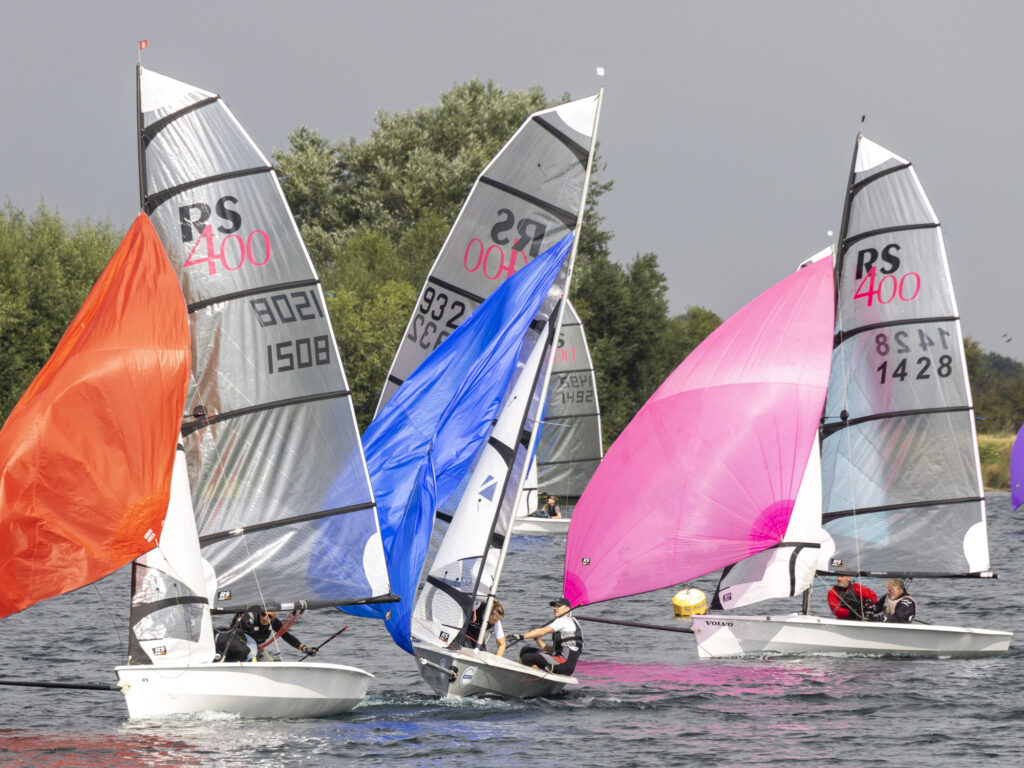
The RS 400’s have been a popular and active class at Notts County for over 10 years and has built up to one of the strongest fleets in the country. This high performance one design asymmetric dinghy offers challenging sailing and competitive racing throughout the year.
At NCSC we have our own class racing during the summer racing series, and benefit from competitive pursuit races with other fast boats in the Spring and Autumn series.
There are over a 1000 RS 400’s in the UK allowing for an active circuit of events organised by the national association which can be seen using this link http://www.rs-association.com This also gives more details about the class & current events plus boats currently up for sale.
The Notts County RS 400 Open meeting takes place in September every year and is part of the “Northern Tour”. There is a large turnout attracted by free camping & Notts County’s hospitality. More details can be found on the “Open Meetings” page on this website
The class runs training / experience days to both encourage newcomers & improve learning within the fleet. Such events are communicated through regular e-news letters and on the Notts County website – so look out for further details!
We also have regular fleet social events and are strong supporters of club activities.
So if you have any questions would like to try an RS400 or would like to join the RS400 fleet RS400@ncsc.org
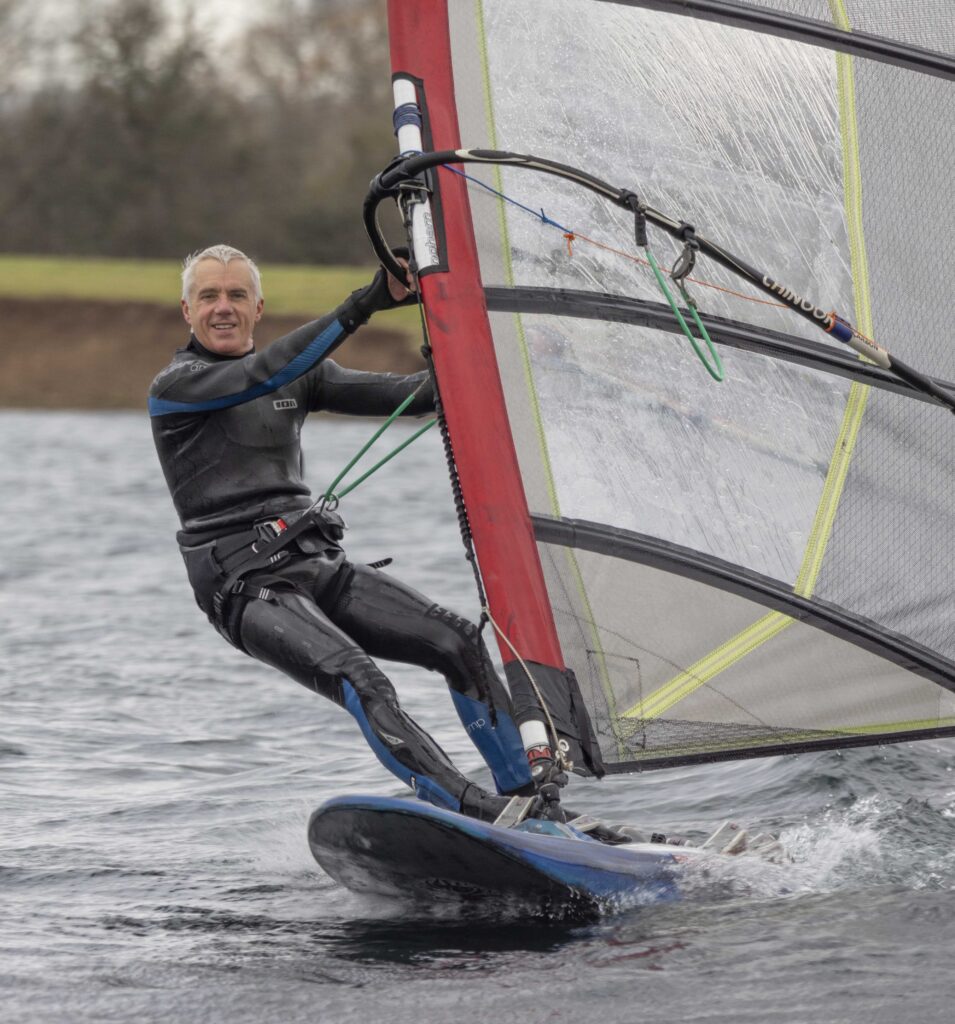
The club is one of the few clubs to have regular windsurf racing with the rest of the club. We sail Raceboards as they suit most ages, whilst juniors use Technos. The Raceboards have two sail sizes 7.8 and under and unlimited (which is generally a maximum of 9.5 sq m).
Due to difficulty in handicapping windsurfers have a separate start, a few Raceboards are owned by the club so windsurfers can try racing, please contact Ian Pilkington the fleet captain, or email windsurfing@ncsc.org.uk
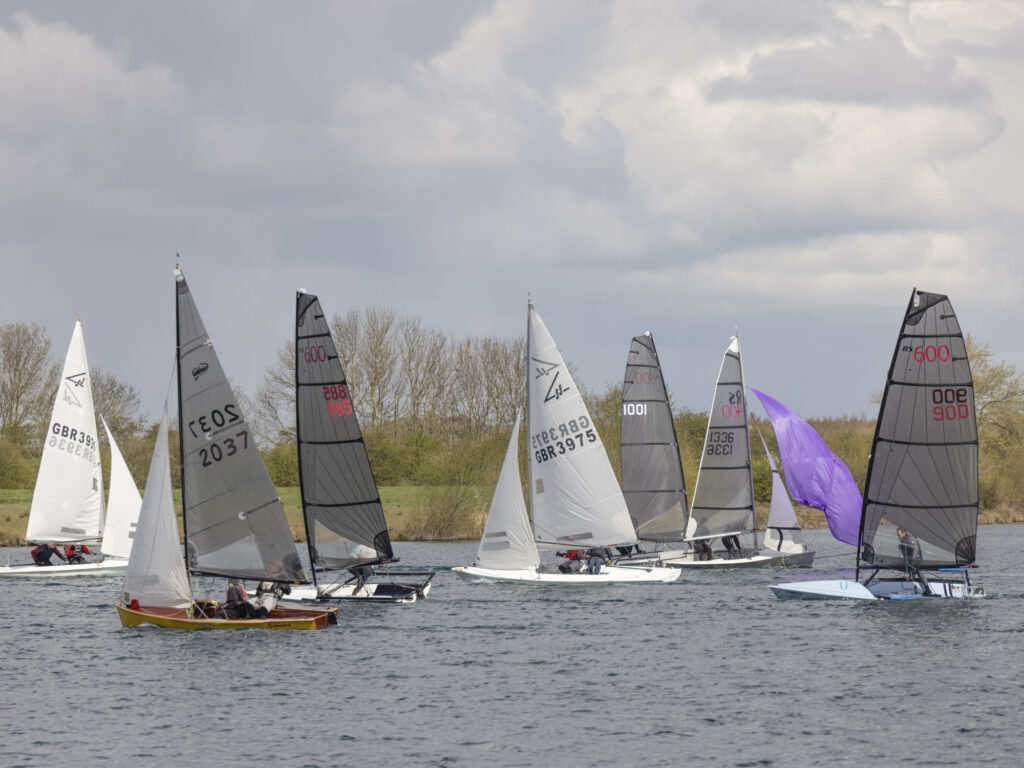
The Menagerie handicap fleet hosts all the dinghies which are not one of the classes adopted by the club. The majority of dinghy types have a handicap under the RYA’s “Portsmouth yardstick” scheme. This allows different dinghy types to race each other. The Race team records each boat’s finishing time and the handicaps are used to calculate each boat’s adjusted time for that race. The boat with the shortest time wins! These handicaps are compiled from results recorded all over the UK and are published each year. They take no account of an individual’s sailing ability (unlike Golf).
The same handicapping method is used to calculate results in all the Saturday, Tuesday & Thursday races as well as the Spring & Winter series. The Menagerie fleet have their own start on Sundays.
Many sailors who join the club start with a dinghy in the Menagerie fleet, often with a design which is more suitable for learning and sailing with family members. Consequently fleet members are in the forefront welcoming new members and helping novices understand the intricacies of the sport on and off the water.
Fleet Representative:- John Davie menagerie@ncsc.org.uk
The RS Aero is a singlehanded sailing dinghy that was designed by Jo Richards as a one-design racer and first built in 2014. It is marketed and distributed by RS Sailing
The Aero is built predominantly of fiberglass. It has a cat rig, a raked stem, a vertical transom, a transom-hung rudder controlled by a tiller with a tiller extension and a retractable dagger board. It weighs 66 lb (30 kg).
Aeros can be fitted with one of four different rig and sail sizes to accommodate a range of sailors of different weights.
RS Aero 5. This ris is designed for children and small sailors and has 54 sq ft (5.0 m2) of sail.
RS Aero 6. This is designed to fit between the 5 and 7 rigs that is similar in size to the ILCA 6 with a sail size of 67 sq ft (6.3 m2)
RS Aero 7. This is designed for medium weight sailors and has 77 sq ft (7.2 m2) of sail.
RS Aero 9. This is designed for heavy weight sailors and has 93 sq ft (8.6 m2) of sail.
The Aero utilizes a unique mix of modern technology, all-around performance and very easy handling.
Fleet rep: Alan Beaton
The National Solo is a classic, one-design, single handed dinghy. Designed by Jack Holt in 1956, the Solo remains a popular dinghy, sailed at many clubs in the UK, Holland and Australia.
Originally designed in wood, competitive boats are now widely available in Foam Reinforced Plastic (FRP) or composite construction (FRP hull and wood deck) as well as wood.
- Light, double-chined hull
- Constructed from wood, GRP or composite (GRP hull, wooden decking)
- Keel stepped, stayed mast
- Fully battened sail
- Inward sloping decks for comfortable sitting out
- Most boats have centre mainsheet, but aft sheeting permitted by class rules
- Nationwide Open Meeting circuit
- Events held in the UK, Holland and other EU Counties.
- National Inland Water Championship held annually in the UK
